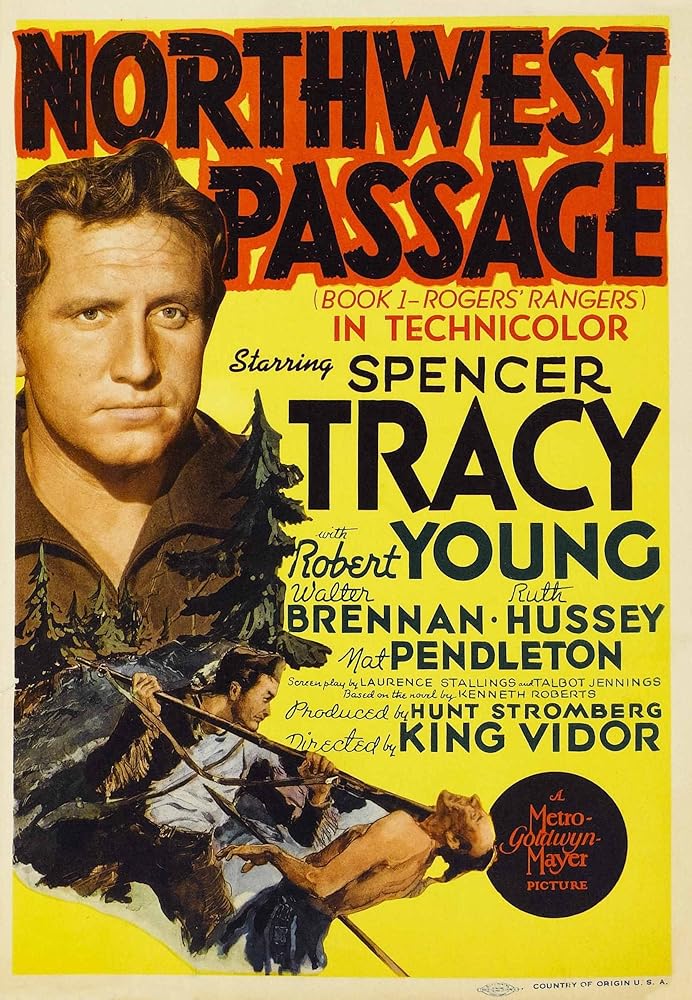
NORTHWEST PASSAGE
(director: King Vidor; screenwriters: Talbot Jennings/Laurence Stallings/based on the book by Kenneth Roberts; cinematographers: William V. Skall/Sidney Wagner; editor: Conrad A. Nervig; music: Herbert Stothart; cast: Spencer Tracy (Major Robert Rogers), Robert Young (Langdon Towne), Walter Brennan (Hunk Marriner), Ruth Hussey (Elizabeth Browne), Louis Hector (Reverend Browne), Nat Pendleton (Cap Huff), Montagu Love (Wiseman Clagett), Regis Toomey (Webster), Lumsden Hare (General Amherst), Isabel Jewell (Jennie Coit), Robert Barrat (Humphrey Towne, Langdon’s shipbuilder father); Runtime: 127; MPAA Rating: NR; producer: Hunt Stromberg; MGM; 1940)
“A rousing adventure story of epic proportions.“
Reviewed by Dennis Schwartz
King Vidor (“The Big Parade”/”Duel in the Sun”/”The Fountainhead”) makes his first film in Technicolor, and it’s visually stunning. It’s a rousing adventure story of epic proportions set in 1759 that follows the exploits of a hearty group of backwoods soldiers dressed in green Robin Hood outfits who are called Roger’s Rangers. The time frame is during the French and Indian War. It’s based on the first part of a 1936 book by Kenneth Roberts that was serialized in The Saturday Evening Post, and is written by Talbot Jennings and Laurence Stallings. It had an excellent box office, but because it cost so much to make it only broke even. Part two was projected, but never came to pass. One caveat worth noting is that it’s intensely racist, which got overlooked when released but has since angered Native American activists and the PC police.
Langdon Towne (Robert Young) is expelled from Harvard, ruining his chances of becoming a pastor. When he tells his hometown Portsmouth, New Hampshire, girlfriend Elizabeth (Ruth Hussey) he now wishes to be an artist, her pompous reverend father (Louis Hector) tells him that’s he’s not good enough for his beautiful daughter. The young man then goes to the local tavern and when drunk mouths off insults at Wiseman Clagett (Montagu Love), the wealthy and well-connected crooked local Brit. To avoid arrest, Langdon and his best friend Hunk Marriner (Walter Brennan) flee up Lake Champlain at Crown Point and try to get to Albany. On the way they meet Major Rogers (Spencer Tracy), who gets the greenhorns drunk and enlists them in his Rangers because he needs the map-making services of Langdon. Rogers takes the Rangers on a dangerous assignment to avenge the hostile raids by the savage Abanaki tribe located at the St. Lawrence river near the Canadian border.The Rangers trek through inhospitable terrain and find they can’t trust their Mohawk guides, and therefore have to go the long way to get to their destination to avoid the French who are waiting to trap them. They reach St. Francis village by crossing thetreacherous rapid river by forming a human chain. Once there they attack at dawn and set the village on fire and viciously slaughter the sleeping Indians for scalping children and settlers in the nearby villages, and free both the white and Indian captives. The trek back to their fort finds the Rangers suffering mentally from battle fatigue and physically from starvation and even exhibiting insubordination against their benevolent despotic leader. Taskmaster Rogers leaves the wounded behind, who are at the mercy of the Indians and the forces of nature.
Back at the fort, Rogers receives the congratulations of the Redcoat general (Lumsden Hare), and is sent on his next mission to find the elusive Northwest Passage (hoping it will be a short-cut for trade routes). Marriner and Langdon return as civilians, with Elizabeth planning to take her man to London where she has ambitions for him to become a famous painter of Indians, the colonial soldiers and to make Rogers into a famous heroic figure.
The exciting story and the great performance by an energized Tracy as the stoic no-nonsense leader of the over a hundred man force of settler recruits, trumps the film’s inexcusable anti-Indian fervor. Nevertheless those sentiments should make the film less appealing to a modern audience whose awareness of human rights has come a long way since films made back then.
REVIEWED ON 5/11/2010 GRADE: A-